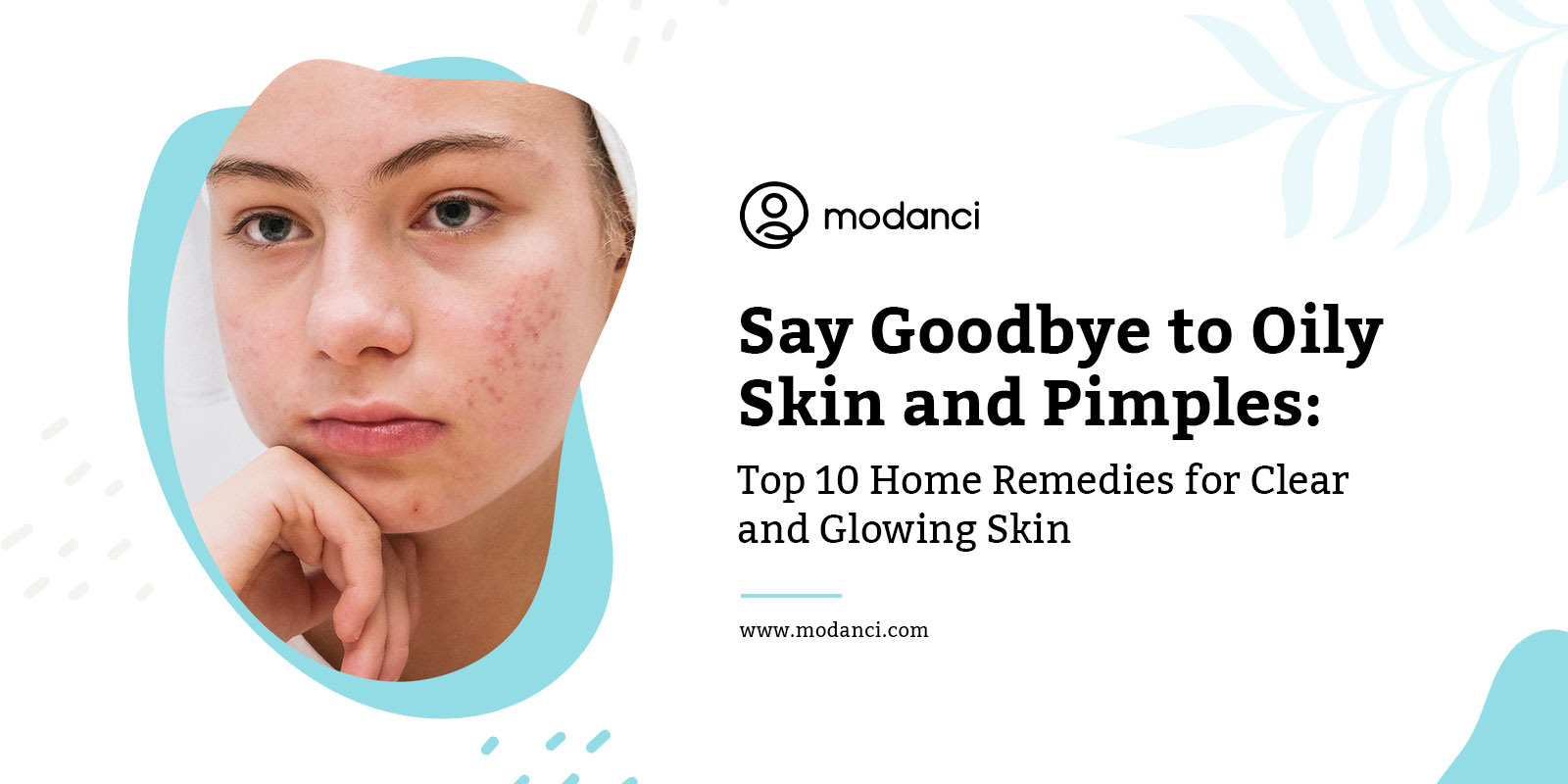Acne and oily skin are difficult to control. Even so, using natural therapies frequently relieves problems without the need for prescription medications or pricey skin care programs. Up to 85% of young adults have acne, making it one of the most prevalent skin disorders in the world.
The most effective acne treatments, like salicylic acid, niacinamide, or benzoyl peroxide, are tried-and-true. However, they can be expensive and have unpleasant side effects like dryness, redness, and irritation.
For the treatment of pimples, many people have turned to home remedies for oily skin and pimples. The research found that over 70% of acne sufferers had attempted non-traditional acne treatments. In this article, we will dive deep into ten home remedies that can be used to control oily skin and pimples.
What are the Causes of Oily Skin and Pimples?
Oily skin is a result of sebaceous glands producing too much sebum. These glands are found below the surface of the skin. A fatty, oily material is sebum. Sebum protects and moisturises your skin and keeps it healthy and shiny. But excess sebum can make skin oily, leading to blocked pores and acne. Stress, hormonal changes, and heredity all have the potential to boost sebum production.
Top Ten Home Remedies for Oily Skin and Pimples
1. Honey and Cinnamon Mask
Research conducted by the National Library of Medicine has revealed the antibacterial effects of honey and cinnamon bark extract against acne. Additionally, a study involving 136 acne patients demonstrated that using antibacterial soap alone proved equally effective in treating acne compared to applying honey on the skin afterwards.
The anti-inflammatory and antibacterial properties of honey and cinnamon further contribute to their potential benefits in addressing acne concerns. Using a honey and cinnamon mask is one of the most effective home remedies for managing pimples, particularly for individuals with oily skin.
How to apply
- Combine two tablespoons of honey and one teaspoon of cinnamon and make a paste.
- Apply the mask after cleansing your face, then let it on for 10 to 15 minutes.
- Rinse the mask off with water and pat your face dry.
2. Tea Tree Oil
The leaves of the tiny Australian tree melaleuca alternifolia are used to make tea tree oil. A 2018 National Library of Medicine found that using tea tree oil on the skin may help reduce acne. In a small study by the National Library of Medicine conducted in 2019, participants who used a tea tree oil ointment instead of benzoyl peroxide reported less dry skin and irritation.
A 2017 study by the National Library of Medicine found that tea tree oil might be a good substitute for topical and oral antibiotics, which, when used repeatedly, can lead to bacterial resistance.
Dilute the tea tree oil before applying it to the skin because it has a high concentration.
How to apply
- Add nine parts of water to one part of tea tree oil.
- Apply the mixture to the affected areas with a cotton swab.
- Apply a moisturiser, if desired.
- If necessary, repeat this process once or twice daily.
3. Green Tea Face Mask
Drinking green tea can help you stay healthy because it contains many antioxidants. Additionally, it might also reduce acne. A 2017 National Library of Medicine study found that this is probably because green tea’s polyphenols help combat bacteria and reduce inflammation, which are significant acne-causing factors.
Eighty women were administered 1,500 mg of green tea extract daily for four weeks in a small 2016 trial by the National Library of Medicine. By the end of the research, the extract-taking women had reduced acne on their noses, chins, and mouth areas.
Green tea extract effectively reduces sebum production and breakouts for those with acne.
How to apply
- Boil green tea leaves for 3 to 4 minutes.
- Wait for the tea to cool before drinking it
- Use a cotton ball or spray bottle to apply it to your skin.
- Let it be dry, then rinse it with the water and pat your skin.
4. Aloe Vera
Aloe vera is a tropical plant that produces a transparent gel from its leaves. The gel is typically found in soaps, creams, lotions, and ointments. It’s common to treat rashes, burns, wounds, and skin irritation, as per the research of Science Direct in the year 2018.
Salicylic acid and sulfur, commonly used to treat acne, are found in aloe vera. A 2017 National Library of Medicine study found that using salicylic acid on the skin reduced acne. Aloe vera gel may aid in treating acne when mixed with additional components like tretinoin cream or tea tree oil, according to a 2018 study.
How to apply
- Scoop the gel from the aloe plant with a spoon.
- Apply the gel immediately to clean skin to act as a moisturiser.
- Repeat once or twice daily, as needed.
Aloe vera gel can also be purchased from a store, but make sure it is 100% pure aloe without any additives.
5. Apple Cider Vinegar
The unfiltered juice from crushed apples, or apple cider, is fermented to produce apple cider vinegar. It is efficient against various germs and fungi, like other vinegar.
Apple cider vinegar contains citric acid. Zinc oxide and citric acid were found to destroy acne.
How to apply
- Combine one part apple cider vinegar with three parts water (for sensitive skin, use more water).
- After cleaning, gently apply the mixture to the skin with a cotton ball.
- Allow it to sit for 5 to 20 seconds before rinsing it with water and patting it dry.
- If necessary, repeat this process once or twice daily.
According to most dermatologists, apple cider vinegar on the skin should be avoided since it might irritate and burn the skin. Use it gently and dilute it with water if you decide to give it a try.
6. Tomatoes
Tomatoes are a natural source of salicylic acid, a popular over-the-counter treatment for acne. The tomato acids can help unclog pores and absorb excess skin oils, potentially benefiting those with acne. So, instead of harsh chemical treatments, consider reaching for a tomato for a more natural solution.
How to apply
- Combine one tomato’s pulp with one teaspoon of sugar.
- Use a circular motion when applying to the skin.
- Leave the mask on for five minutes.
- Apply warm water to rinse.
Simply applying tomato pulp or tomato slices to your skin is also another effective option.
7. Almonds
Ground almonds are helpful as a scrub for your skin and absorb extra oil and pollutants. Almonds are also beneficial as a natural exfoliant for the skin. It has the quality to remove dead skin cells and ability to absorb excess oil. It’s a great alternative to chemical-laden scrubs, and the skin feels much smoother and healthier after use.
How to apply
- Grind three teaspoons of raw almonds to a fine powder.
- Add two tablespoons of raw honey.
- Apply the mixture to your face using gentle circular strokes.
- After rinsing with warm water, pat dry.
Almond face masks are unique for your skin. Just grind up almonds and mix them with honey. But be careful if you have nut allergies. Apply for 10-15 minutes, use warm water to rinse, and pat dry for great results!
8. Egg Whites and Lemons
Egg whites and lemons are believed to aid in pore tightness. Lemon and other citrus fruit acids may facilitate oil absorption. Lemons possess natural antimicrobial properties. Using lemons is an excellent way to sanitise surfaces naturally to maintain cleanliness. Additionally, they have a pleasant aroma and are completely non-toxic.
How to apply
- Mix one egg white and one teaspoon of freshly squeezed lemon juice well.
- Apply to your face, then let it dry for ten minutes.
- Rinse it off and wipe your face using a warm cloth.
9. Oatmeal
Muesli absorbs extra oil and calms sensitive skin. Additionally, it helps to exfoliate dead skin. Typically, ground oatmeal is used in facial masks. It pairs well with mashed fruit like bananas, apples, papaya, yoghurt, and honey.
How to apply
- Mix boiling water and 1/2 cup of ground oats to create a paste.
- Add one teaspoon of honey to the paste of oats.
- Massage the oatmeal mixture into your face for about three minutes. Next, rinse with warm water and pat your face dry.
- The oatmeal mixture can also be applied to your face and left on for 10 to 15 minutes.
- Next, give your face a warm water rinse and pat yourself dry.
10. Cosmetic Clay
Cosmetic clays, commonly known as healing clays, cure various skin disorders and absorb skin oil. French green clay is a popular acne and oily skin treatment due to its excellent absorbency. French green clay is available in the form of a powder. Cosmetic clay is one of the most effective home remedies for oily skin. They are gentle and leave skin soft and smooth without irritation.
How to apply
- Add roughly a teaspoon of clay to filtered water or rose water to create a pudding-like consistency.
- Apply the mixture to your face and let it dry.
- After a few minutes, wash your face with warm water and pat it dry.
- For skin-friendly masks, apply a water-soluble clay mask.
Conclusion
Numerous natural therapies are excellent and effective in curing oily skin. Aloe vera, Apple cider vinegar, Tomatoes, Almonds, Egg whites and Lemons, Oatmeal, Cosmetic clay, and Honey and Cinnamon masks are a few of them.
It can be challenging to prevent oily skin from hormones or heredity. Consistent skin care routines and avoiding unhealthy diets such as processed foods, fried foods, and foods high in sugar may be beneficial.
FAQs
1. What are the top 10 home remedies for clear and glowing skin that can help me combat oily skin and pimples?
Natural home remedies are very effective and safe for clear and glowing skin, which can help to combat oily skin and pimples. Natural remedies include Aloe vera, Apple cider vinegar, Tomatoes, Almonds, Egg whites and Lemons, Oatmeal, Cosmetic clay, and Honey and Cinnamon masks.
2. Can I use natural ingredients at home to control oiliness and prevent pimples on my skin? If so, what are they?
Yes, natural ingredients available at home can be applied to control oiliness and prevent pimples on the skin. Aloe vera gel can treat acne and prevent breakouts if you have oily skin. Aloe vera gel rejuvenates the skin. Therefore, you can use it as a moisturiser if your face is oily. An aloe vera gel face pack is one of the most effective solutions for oily skin.
3. Are there any proven home remedies to help me achieve clear and glowing skin without causing further breakouts or skin irritation?
Few home remedies can heal and help achieve clear and glowing skin without further breakouts or irritation, which include aloe vera, apple cider vinegar, tomatoes, almonds, egg whites and lemons, oatmeal, cosmetic clay, and honey and cinnamon masks.
4. How can I use natural ingredients at home to balance oil production and promote a healthy complexion?
- Home-based natural ingredients which are amazing for balancing oil production and promoting a healthy complexion,
- Cleansing regularly
- Limiting alcohol use
- Using blotting papers or medicated pads
- Moisturising regularly
- Making a facial mask
- Using products with green tea
- Making dietary changes
5. Are these ten home remedies safe for all skin types, and how often should they be used to maintain clear and radiant skin?
Home remedies are natural and safe for all skin types. However, applying home remedies too often can create some irritation on the skin, and it may lead to breakouts, inflammation, and rashes. Make sure to take a patch test before using any home remedy. Consult a doctor or a dermatologist if you have skin irritation or allergic reactions.
Read More:
- Clear Skin: A Comprehensive Guide to Removing Acne Scars
- 21 Effective Home Remedies for Soothing Skin Rashes Naturally
- Say Goodbye to Dryness: 12 Effective Home Remedies for Dry Skin
- Clear Skin Ahead: Tips and Tricks for Getting Rid of Acne
- Say Goodbye to Dryness: 12 Effective Home Remedies for Dry Skin




